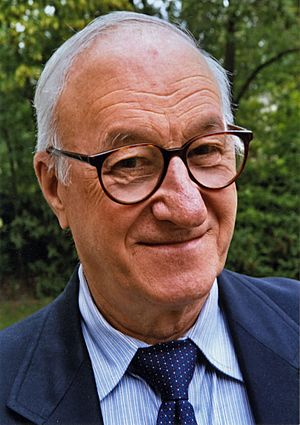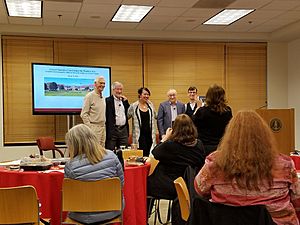Albert Bandura facts for kids
Quick facts for kids
Albert Bandura
|
|
|---|---|
 |
|
| Born | December 4, 1925 |
| Died | July 26, 2021 (aged 95) Stanford, California, U.S.
|
| Nationality | |
| Alma mater | University of British Columbia University of Iowa |
| Known for | Social cognitive theory Self-efficacy Social learning theory Bobo doll experiment Human agency Reciprocal determinism |
| Awards | E. L. Thorndike Award (1999) |
| Scientific career | |
| Fields | Psychology, developmental psychology |
| Institutions | Stanford University |
| Influences | Robert Sears, Clark Hull, Kenneth Spence, Arthur Benton. Neal Miller |
Albert Bandura (December 4, 1925 – July 26, 2021) was a famous Canadian-American psychologist. He was a professor at Stanford University for many years.
Bandura made important contributions to education and psychology. He is best known for his ideas on social learning theory (also called social cognitive theory). He also developed the idea of self-efficacy, which is about believing in your own ability to succeed.
He is also famous for the 1961 Bobo doll experiment. This experiment showed how people, especially children, learn by watching others.
A survey in 2002 ranked Bandura as the fourth most-cited psychologist ever. Many people considered him one of the most influential psychologists of all time.
Contents
Early Life and Learning
Bandura was born in Mundare, Alberta, Canada, in 1925. It was a small town with about 400 people. He was the youngest of six children and the only boy.
Because there were not many schools in his small town, Bandura learned to be independent. He taught himself a lot and was very motivated to learn. These skills helped him throughout his long career.
His parents were from Poland and Ukraine. They encouraged him to explore opportunities outside their small community. One summer, after high school, Bandura worked in the Yukon. He helped protect the Alaska Highway. He later said this experience made him interested in why people think and behave in certain ways.
Bandura moved to the United States in 1949 and became an American citizen in 1956. He married Virginia Varns in 1952, and they had two daughters, Carol and Mary.
Education and Career
Bandura started studying psychology almost by accident. He took a psychology course in college to fill his early mornings. He quickly became very interested in the subject.
He earned his bachelor's degree from the University of British Columbia in 1949. Then, he went to the University of Iowa, which was a major center for psychology at the time. He received his master's degree in 1951 and his Ph.D. in clinical psychology in 1952.
At Iowa, Bandura became interested in studying psychology through experiments. He wanted to test ideas in ways that could be repeated. He also started thinking about how people's thoughts and feelings, not just their actions, influence their behavior. He developed the idea of reciprocal determinism. This means that a person's behavior, their environment, and their personal thoughts and feelings all influence each other. This was a new idea at a time when many psychologists focused only on observable behaviors.
Starting at Stanford
After finishing his studies, Bandura joined Stanford University in 1953. He taught there until he became a professor emeritus in 2010.
In 1974, he was elected president of the American Psychological Association (APA). This is the largest group of psychologists in the world.
Important Research
Bandura's early research focused on how people learn from others. He was especially interested in how watching others affects our motivation, thoughts, and actions. He worked with his first doctoral student, Richard Walters, to study social learning and aggression. Their work showed how important it is to learn by watching others.
Social Learning Theory

Bandura's early research looked at how children and adults learn new behaviors by watching others. He found that people often imitate what they see.
Social learning theory says that three main things control our behavior:
- First, what happens before an action can influence it. For example, seeing someone else get a reward for something might make you want to do it too.
- Second, what happens after an action (like rewards or punishments) affects whether you do it again. You learn from your own experiences or by watching others.
- Third, our thoughts are very important in social learning. For example, if you remember a bad experience with someone, that memory can make you react differently to them.
Social learning theory has been used in many areas, including education. It helped create "Entertainment-Education," which uses TV shows or movies to teach people important social lessons.
Studying Aggression
Bandura's research with Richard Walters led to his first book, Adolescent Aggression, in 1959. He also wrote Aggression: A Social Learning Analysis in 1973.
At the time, many psychologists believed that behavior was mostly shaped by rewards and punishments. Bandura thought this was not enough to explain human behavior. He believed that people learn many behaviors by watching others. He started looking at how to help aggressive children by understanding where they learned their violent behaviors.
The Bobo Doll Experiment
In 1961, Bandura conducted a famous experiment called the Bobo doll experiment. He wanted to show that children learn aggressive behaviors by watching adults.
In the experiment, children watched an adult play with a Bobo doll (a large, inflatable toy). Some adults acted aggressively towards the doll, hitting and yelling at it. Other adults played calmly. Later, the children were left alone with the Bobo doll.
Bandura found that children who saw the aggressive adult were much more likely to act aggressively towards the doll themselves. If the adults were praised for their aggression, the children were even more likely to hit the doll. But if the adults were punished, the children were less likely to be aggressive.
This experiment was very important. It helped change the focus of psychology from just studying observable behaviors to also studying how our thoughts and observations influence us. It showed how much young people are influenced by the actions of adults around them.
Social Cognitive Theory
By the mid-1980s, Bandura's ideas grew into what he called social cognitive theory. This theory looked at human thinking in a more complete way, within the context of social learning.
How We Think and Act
In 1986, Bandura published Social Foundations of Thought and Action: A Social Cognitive Theory. In this book, he described people as being able to organize themselves, plan ahead, think about their own actions, and control themselves. This was different from the older idea that humans were mostly controlled by outside forces.
He introduced the idea of "triadic reciprocal causation." This explains how human behavior, environmental factors, and personal factors (like thoughts, feelings, and biology) all influence each other. His focus on how people can control themselves led to his later work on self-efficacy.
Self-Efficacy
Self-efficacy is a key part of Bandura's theory. It refers to a person's belief in their own ability to succeed in specific situations or to achieve a goal.
Bandura found that when people believed they could overcome their fears, they were more likely to succeed. For example, in studies with people who were afraid of snakes, those who believed they could handle a snake were more likely to overcome their phobia.
He spent a lot of time studying how believing in yourself affects how you function. His book, Self-efficacy: The exercise of control, was published in 1997. It explored how self-efficacy beliefs play a big role in human behavior and change.
Bandura on Education
Bandura's social cognitive theory has a big impact on students and teachers in education. The theory focuses on how our behavior and growth are shaped by our thoughts during social activities.
Key ideas from social cognitive theory used in education include:
- Self-efficacy: A student's or teacher's confidence in their ability to do certain things to reach their goals.
- Self-regulation: The ability to control your own learning and behavior.
- Observational learning: Learning by watching others.
- Reciprocal determinism: The idea that a person's behavior, environment, and personal factors all influence each other.
Bandura's research shows that when teachers and students have high self-efficacy, they set higher goals. They are also more likely to work hard to achieve those goals.
Death
Albert Bandura passed away at his home in Stanford, California on July 26, 2021. He was 95 years old.
Awards and Honors
Bandura received many awards and honorary degrees from universities around the world.
Some of his major awards include:
- The Award for Distinguished Scientific Contributions from the American Psychological Association (1980).
- The Thorndike Award for Distinguished Contributions of Psychology to Education (1999).
- The Lifetime Achievement Award from the Association for the Advancement of Behavior Therapy (2001).
- The University of Louisville Grawemeyer Award for contributions to psychology (2008).
In 2014, he was made an Officer of the Order of Canada. This honor recognized his important work in social psychology, especially how observation influences learning and aggression. In 2016, he received the National Medal of Science from President Barack Obama. This is one of the highest scientific honors in the United States.
Major Books
Bandura wrote many influential books. Here are some of his most well-known:
- Bandura, A. (1997). Self-efficacy: the exercise of control.
- Bandura, A. (1986). Social Foundations of Thought and Action: A Social Cognitive Theory.
- Bandura, A. and Walters, R. H.(1963). Social Learning & Personality Development.
- Bandura, A. (1977). Social Learning Theory.
See Also
 In Spanish: Albert Bandura para niños
In Spanish: Albert Bandura para niños
 | Tommie Smith |
 | Simone Manuel |
 | Shani Davis |
 | Simone Biles |
 | Alice Coachman |

